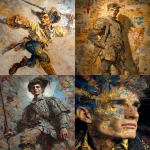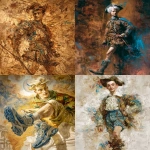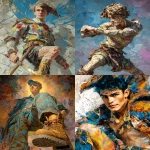Explore the Best AI Image Gallery

Reimagining Product Photography: The Impact of AI Technologies
In recent years, artificial intelligence (AI) has permeated almost every industry, revolutionizing workflows and enhancing creative potential. One sphere that has notably embraced AI is product photography. Utilizing AI technologies in this field not only streamlines the process but also opens up avenues for creative experimentation and innovation. In this blog post, we will explore the impact of AI on product photography, potential applications, ethical considerations, and future trends shaping this rapidly evolving landscape.
The Transformation of Product Photography
Traditionally, product photography required extensive time, effort, and resources, from arranging elaborate setups to managing lighting and angles. However, AI is changing the dynamics of this industry by automating multiple aspects of photography while ensuring high quality. With the introduction of advanced tools, photographers can now focus on creative direction instead of technical adjustments.
AI-Powered Image Generation
One of the most impactful applications of AI technology in product photography is the use of AI-powered image generation tools. These systems are capable of creating realistic images of products from 3D models or even sketches. Companies like Adobe and Canva have developed software that leverages AI algorithms to predict lighting, texture, and colors to render product images that appear highly professional. This not only saves time but also significantly reduces costs associated with shooting, editing, and retouching.
Enhancing Creative Possibilities
AI technologies are also allowing photographers to explore greater creative heights. By employing machine learning algorithms, photographers can analyze large datasets to understand trends in styling and composition. AI-generated recommendations offer photographers insights into what aesthetic could drive consumer engagement. Furthermore, tools that provide background removal, object enhancement, and style transfer enable photographers to create visually stunning images that captivate consumers' attention.
Ethical Considerations of AI in Product Photography
As with any technological advancement, the rise of AI in product photography brings forth ethical concerns. The pervasive use of imagery created or heavily edited by AI can lead to consumer mistrust. If audiences cannot distinguish between genuine product representations and AI-enhanced images, it could undermine brand authenticity. Moreover, there are broader discussions surrounding copyright issues. For instance, if an AI tool produces an image based on existing works from various artists, it raises questions about ownership and intellectual property rights.
Addressing Ethical Concerns
Brands and photographers must exercise caution and transparency in their use of AI-generated imagery. Always credit the tools that contribute to the creative process and specify if an image has been significantly altered or created by AI. Open dialogue about the capabilities and limitations of AI can facilitate awareness among consumers, thereby fostering trust and authenticity.
The Future Landscape of AI in Product Photography
Looking toward the future, the role of AI in product photography will likely expand. New technologies, including augmented reality (AR) and virtual reality (VR), are set to revolutionize how consumers engage with products. By incorporating AR features into product images, brands can offer customers a more immersive shopping experience, allowing them to visualize products in their own environments.
Embracing Continuous Innovation
As machine learning models evolve, they will improve in generating more personalized and contextually relevant images based on consumer data. For brands looking to stay ahead in the competitive market, the integration of AI-enabled techniques will be essential for delivering personalized, interactive experiences to consumers. Additionally, the growth of e-commerce will drive the demand for high-quality product imagery, further solidifying AI’s central role in photography.
Conclusion
AI is undoubtedly reshaping the landscape of product photography, enabling creativity and efficiency like never before. While the technological advancements come with ethical considerations, the future is promising for those ready to embrace innovation. As brands navigate these changes, staying authentic and transparent will be crucial in winning consumer trust. Ultimately, the fusion of AI and photography is a revolution that holds endless possibilities.

](https://images.ai-img.art/thumbnails/150/1614d64dd7156c95db952258978be809eb3db8cea4453fec69c49cbdfe63fa94.webp)




](https://images.ai-img.art/thumbnails/150/3a60737a5b67fa252207ad1ae6db245a26284f53fb5846996bb34515b39ff269.webp)





](https://images.ai-img.art/thumbnails/150/8c3bd422d50d35735d8fb33bd314a79e30e5b150129d5d09bdad822a2007593f.webp)